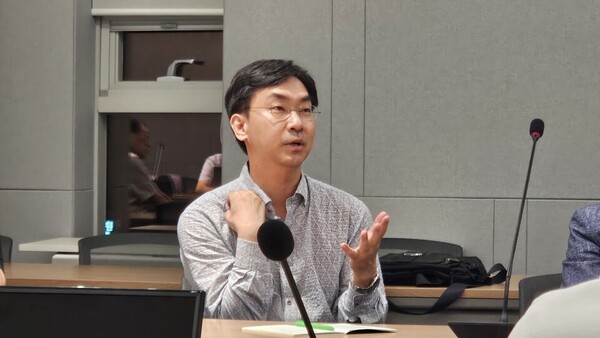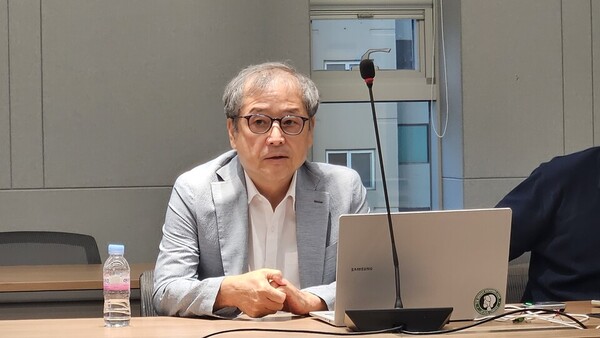The government's push to increase the medical school enrollment quota has led to growing skepticism and a sense of burden among medical professors about medical education.
Some hardline professors even express views to boycott the medical student selection process for the 2025 entrance exam.

Professor Choi Se-hoon of the Department of Cardiovascular and Thoracic Surgery at Asan Medical Center made the remarks during a meeting of the Medical Ethics Research Association at the Korea Medical Association (KMA) on Monday.
Choi said there is a movement among professors to boycott the medical student selection process to express their opposition to the government's plan to increase the number of medical school students.
"Among professors interested in entrance examination and education, there is a growing opinion that they will boycott the selection of medical students in the entrance examination,” Professor Choi said. "They have not agreed to the increase in medical school students and cannot participate in selecting the increased students. They are overburdened with workloads and do not have the energy to teach.”
He continued, "It seems as if medical professors will not participate in or boycott the selection of students from the class of 2025. I don't know how to solve the current situation. I feel hopeless and even scared."
Professor Choi added that there is also a growing sense of helplessness about preparing for assessing the education environment under the increased enrollment quota by the Korea Institute of Medical Education and Evaluation.
"Professors are too scared to prepare for the evaluation or take up related positions. They don't even want to dip their toes in the water," Choi said. ‘To prepare for the evaluation, they must work overtime every day for a whole month in addition to their research. These professors are skeptical whether they can meet the accreditation standards under the increased admissions quota.”
He also said that the stress on professors who remain in hospitals is causing an increasing number of them to resign.
"Professors are now struggling to stay on call, but I heard many think about resigning due to the heavy workload," said Lee Myung-jin, an otolaryngologist and a member of the Korean Medical Association's Legal and Ethics Committee. "They find it difficult to resign due to the heavy workload now, but there are speculations that mass resignations will occur among professors once the dust settles down.”
Choi also said, "Not long ago, a pediatric emergency room professor who was on call was assaulted by a patient’s caregiver. There is also a subtle atmosphere between senior and junior professors over the night duty. I know many professors with confidence in themselves want to leave.”
Others said there is no reason for medical residents to return for training given their inclinations.

Ahn Duck-sun, director of the KMA’s Research Institute for Healthcare Policy, pointed out that the mistrust between the government and trainee doctors, as well as the training environment that does not match their inclinations, is preventing them from returning.
"From trainee doctors’ perspective, it is a reasonable choice not to return. The government hasn't shown anything," Ahn said. "There seems to be a lot of distrust among trainee doctors, not only in the government but to the KMA. Furthermore, I think there is an atmosphere of distrust in the older generation of doctors."
"In the past, everyone was poor, so they wanted to learn at university hospitals and move to better places later," he said. "However, the current generation of doctors has grown up in a different environment and has higher standards for training. If we had provided a quality training program and created an environment that allowed them to rest properly, they would have endured the 80-hour workweek because they would have learned something."
Professor Choi also said that it is difficult for trainee doctors to return to work due to their disposition, and, they will unlikely return this year.
"The current generation of doctors has no experience living in a non-developed country. The answer lies in the difference in the environment,” he said. "At the recent congress of the Seoul Medical Association, specialists asked doctors, 'What will you do? You should at least become specialists, shouldn’t you?' However, they answered, 'Why should we be worried about it’? The trainee doctors said the current situation is unfair, and they won't come back."
"There is also a lot of distrust of the government. "The medical students and trainee doctors say that even if the government accepts all their demands except for the 2025 medical school enrollment quota, they won't return,” Professor Choi said. "The agreement with the government has never been honored. They will not come back this year. We have to wait and see for at least a year."
Related articles
- Government grilled for lack of fiscal estimate in increasing medical students
- Senior doctors at major tertiary hospitals in Seoul postpone strike amid government policy dispute
- 94.7% of trainee doctors at tertiary hospitals in greater Seoul refuse to work
- ‘Discussion should focus on patient option in reimbursing kidney cancer drugs’
- ‘Weaning tertiary hospitals off reliance on trainee doctors will raise labor costs by 50%’
- Supreme Court rejects doctors’ appeal to halt 2025 medical school quota increase
- Feeling sorry and helpless, a surgeon chose to fast
- National university hospitals face bankruptcy risk amid $912 mil. revenue drop
- 'The health minister isn't the one to make such a bold move to increase 2,000 medical student seats'
- Government considers regional restrictions on trainee doctor applications starting September
- Cardiothoracic surgery faces collapse: only 12 trainees left after 95 resign in protest of government policy

